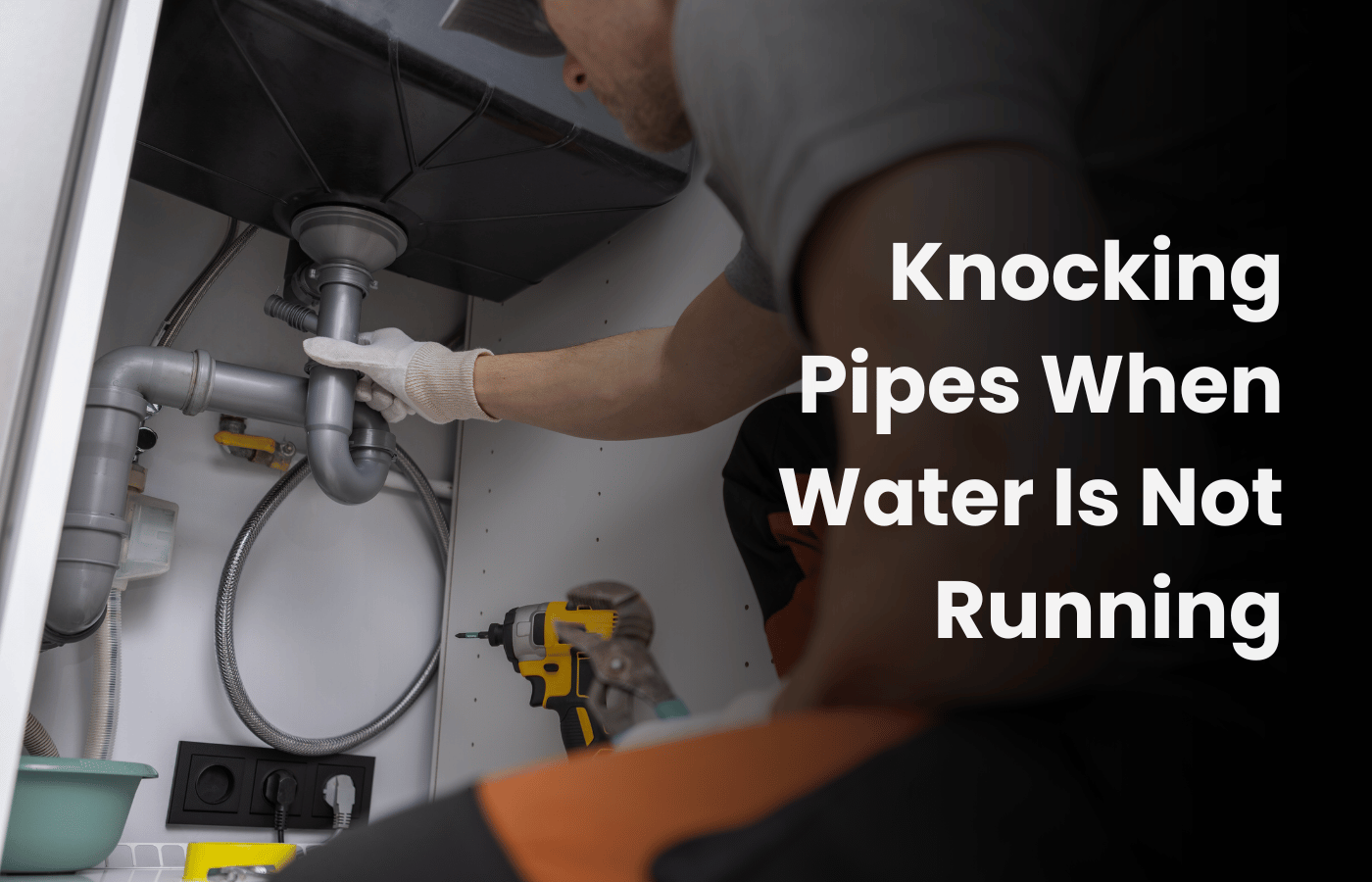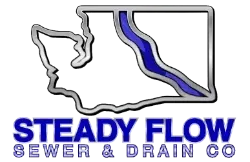Knocking Pipes When Water Is Not Running

Knocking Pipes When Water Is Not Running: 8 Critical Causes & Fixes
Have you ever heard strange banging or knocking sounds coming from your walls, even when no water is running? That unsettling noise is more than just a nuisance—it could be a warning sign that something is off in your plumbing system. At Steady Flow Sewer & Drain, we’ve seen how small pipe noises can grow into major plumbing emergencies. In this guide, we’ll explore the key reasons behind knocking pipes when water is not running, how to diagnose the issue, and what can be done to fix it for good.
Is It Normal to Hear Pipes Knocking When Water Isn’t Running?
It might seem unusual to hear your plumbing acting up when no faucet or appliance is in use. Yet, this is a common issue in homes across Seattle and beyond. Most homeowners ignore these sounds, thinking they’re harmless or will go away. But pipe noises—especially when water isn’t running—often point to deeper mechanical or pressure-related problems. In many cases, it boils down to knocking pipes when water is not running, a condition that requires attention before it leads to more severe damage.
Why This Matters:
- Knocking can loosen joints or fittings
- Long-term vibrations may lead to leaks or burst plumbing pipes
- Could signal hidden issues like sediment, pressure spikes, or thermal expansion
Ignoring these sounds can lead to expensive repairs, water damage, or even system-wide failure.
Main Causes of Knocking Pipes When No Water Is Running
Let’s break down the most common causes of knocking pipes when water is not running and what they indicate about your plumbing.
1. Water Hammer (Hydraulic Shock)
Water hammer occurs when water flow suddenly stops, sending a shockwave through the plumbing system. This creates a loud banging or thudding noise. Although this usually happens when shutting off water, residual pressure in the plumbing pipes can sometimes cause knocking sounds even when no water is being used.
Signs include:
- Loud bang after a faucet or appliance shuts off
- Knocking when no fixture is actively in use
- Vibrations in walls after using appliances
This condition is a common reason for knocking pipes when water is not running and can damage pipe joints, valves, and fittings if left unchecked.
2. Thermal Expansion in Hot Water Pipes
When hot water travels through metal pipes, the material expands. As the pipes cool, they contract, and the movement can create a knocking or ticking noise. This is especially noticeable after hot water use from showers or dishwashers.
Why it happens:
- Pipes rub against structural framing like studs or joists
- Expansion happens silently but contraction causes sudden release noise
- Common with copper pipes and other metal plumbing components
While harmless in short bursts, it’s a sign your plumbing system may need better insulation or anchoring. It’s another scenario that contributes to knocking pipes when water is not running, especially at night.
3. Loose or Unsecured Pipes
Unsecured pipes are a frequent cause of random knocking. Even without water running, residual pressure or vibrations from nearby appliances can cause pipes to shift and hit against wood framing or other plumbing pipes.
Where it occurs:
- Behind drywall
- In crawlspaces or basements
- Along ceilings or floor joists
If the pipe fittings aren’t tightly secured with proper fasteners or pipe lashes, the motion can create a consistent thudding or knocking sound. This often results in knocking pipes when water is not running in older homes.
4. Sediment Buildup in Water Heater or Pipes
Hard water in the Seattle area often leads to sediment buildup inside water heaters and plumbing pipes. This restricts water flow, increases internal pressure, and can create loud noises—especially in hot water lines.
Symptoms include:
- Knocking when hot water hasn’t been used for a while
- Rumbling or popping near the water heater
- Fluctuations in water pressure
Over time, sediment can shorten the lifespan of your water heater and cause pipe erosion. These effects contribute to knocking pipes when water is not running, especially in systems with high mineral content.
5. Air Trapped in the Pipes (Airlocks)
Air pockets in the plumbing system can lead to a percussive, knocking noise, especially when water is not running. Air can become trapped during repairs, water main breaks, or even just from system imbalances.
How it behaves:
- Gurgling or knocking when turning on faucets
- Intermittent knocking even when no valves are in use
- Air releasing sounds followed by smooth flow
This is a classic case of knocking pipes when water is not running that can be resolved by bleeding the plumbing system correctly.
6. High Water Pressure
Excessive water pressure (above 80 PSI) puts extra stress on plumbing pipes and fittings. Even in the absence of water running, that pressure can cause pipes to hum, knock, or vibrate.
High pressure issues may stem from:
- Poorly calibrated well systems
- Faulty pressure-reducing valves (PRVs)
- Thermal expansion in closed-loop systems
Unchecked, this can lead to fixture damage, pipe leaks, and premature plumbing system wear. It’s also a frequent cause of knocking pipes when water is not running.
7. Vibrating Pipes Behind Walls or Ceilings
Pipe vibration happens when water movement causes unsecured or poorly insulated pipes to oscillate. This vibration transmits to nearby wood framing, resulting in thudding or buzzing noises.
Vibrations may occur:
- When heating systems operate
- After dishwasher or laundry cycles
- From exterior temperature fluctuations
These vibrations can create knocking pipes when water is not running, particularly in homes with copper piping.
8. Old or Worn Pipe Fixtures and Valves
As plumbing components age, washers, valves, and connectors begin to loosen or degrade. These old parts may whistle, knock, or hum when under pressure—even with no water actively flowing.
Appliances most affected:
- Dishwashers
- Washing machines
- Water heaters
Replacing aging valves and flexible supply lines can eliminate mysterious knocking noise. It’s a simple fix for knocking pipes when water is not running.
When and Where the Knocking Happens Matters
Tracking the time and location of knocking can reveal the underlying issue. If you frequently experience knocking pipes when water is not running, it’s critical to narrow down these patterns.
Common timing patterns:
- During appliance cycles: Especially dishwashers or laundry machines
- After hot water use: Suggests thermal expansion
- Random times: Could indicate pressure or trapped air
- Middle of the night: Cooling pipes contracting after earlier use
Listen closely to where it’s coming from:
- Behind walls in kitchens or bathrooms
- Near water heater or basement plumbing
- In ceilings above laundry rooms or bathrooms
How to Diagnose Knocking Pipes in Your Home
Listen for Patterns
Keep a log of when you hear noises:
- Does it follow appliance use?
- Is it louder during winter?
- Do noises fade over time or intensify?
Locate the Sound
Walk around your house and pinpoint sound origins:
- Near water heater?
- Under sinks?
- In floor or ceiling joists?
Check for Loose Pipes
If you have access to exposed plumbing:
- Gently push or shake pipes
- Look for movement or contact with framing
- Inspect for worn or missing pipe lashes
Inspect Water Pressure
You can purchase a home pressure gauge or call a plumber:
- Ideal range: 55–75 PSI
- If above 80 PSI, you may need a PRV installed to fix excessive water pressure
Examine Water Heater for Sediment
Warning signs include:
- Popping noises from the tank
- Reduced hot water supply
- Knock echoing from heater
A simple flush can clear buildup and reduce pressure spikes. That’s often enough to fix knocking pipes when water is not running.
How a Professional Plumber Can Fix Knocking Pipes
Install Water Hammer Arrestors
Arrestors absorb the shock that causes water hammer and reduce knocking sound.
- Placed near dishwashers, washing machines, or other quick-closing valves
- Essential in homes without built-in air chambers
Add or Replace Pipe Insulation
Insulation minimizes movement and vibration.
- Foam sleeves or wrap-around insulation
- Prevents thermal expansion-related noises
Secure Loose Pipes
Professionals use:
- Copper straps for metal pipes
- Plastic brackets for PEX or PVC
- Fastener spacing: every 1–2 feet for stability
Flush the Water Heater
Removes hardened mineral layers and sediment buildup.
- Extends tank lifespan
- Restores pressure balance
- Reduces banging pipes from sediment interference
Bleed the Air from the System
A plumber can purge the plumbing system in the correct order:
- Start with the lowest-level faucet
- Work upward to remove trapped air
Adjust Water Pressure
If pressure is consistently high:
- Install or replace a PRV (pressure-reducing valve)
- Test pressure at different fixtures
- Avoid future pipe stress and loud noises
Special Considerations for Copper Piping Systems
Copper pipes are a strong but thermally sensitive part of your plumbing system.
- Expands significantly when hot water runs
- Contracts as it cools, often scraping framing
- Creates banging pipes, ticking, or creaking noises
To prevent this:
- Add insulation between copper and wood framing
- Allow space between pipes and walls
- Use plastic grommets or sleeves to stop knocking noise
If you have knocking pipes when water is not running, and they’re made of copper, special attention is needed.
What If the Noise Is Coming from Drains or Fixtures?
If the knocking isn’t in the supply line, it may be linked to drainage or appliance issues.
- Gurgling in drains often signals clogs or venting problems
- High-pitched whining usually indicates worn valves or washers
- Echoing bangs might come from sediment in the water heater
A professional inspection can rule out plumbing versus drainage issues.
Why You Shouldn’t Ignore the Knocking Noise
Delaying action on pipe noise can lead to:
- Loose joints leaking into walls or ceilings
- Increased risk of pipe bursts under pressure
- Structural vibration over time
You could be facing drywall repair, mold remediation, or full pipe replacement—just from ignoring plumbing noises. Addressing knocking pipes when water is not running as early as possible will save you major repair costs.
How Steady Flow Sewer & Drain Can Help Stop Knocking Pipes
At Steady Flow Sewer & Drain, we understand the frustration of hearing knocking pipes when water is not running—and not knowing what’s causing it. Our team is licensed, bonded, and trained to pinpoint and resolve pipe noise problems with precision and care.
We offer:
- In-depth inspections using advanced diagnostic tools
- Water heater flushing and sediment removal
- Pipe securing and insulation upgrades
- Water pressure regulation and PRV installation
- Water hammer arrestor setup at high-risk fixtures
Each service is performed with attention to your specific plumbing setup and house design. Our solutions aren’t just quick fixes—they’re built to last. If you’re dealing with knocking pipes when water is not running, don’t wait for it to get worse—call our experts today.
Contact Steady Flow Sewer & Drain
When your drains empty slowly, smell bad or back up, you need a reliable sewer and drain company to fix it right the first time. At Steady Flow Sewer & Drain, our licensed and bonded company has built a solid reputation for effective and budget-friendly drain and sewer services. We prioritize customer satisfaction, and guarantee our results.
As a locally owned and operated business, we take pride in serving the greater Seattle community. We are a sewer and drain expert that operates with 100% integrity. Our honest assessments of your drains and plumbing pipes provide you with helpful information and peace of mind. We offer 24/7 emergency services and have the skills and equipment to handle ANY plumbing or drain issue.
Steady Flow Drain Co. is a fully licensed and certified contractor by the state of Washington Labor & Industries; our license number is STEADFS792QE. Certified Contractors for the Lakehaven Water and Sewer District in Federal Way.
24/7 Support for Local Homeowners & Businesses
Call us Now: (206) 984-8909
Based in Federal Way, WA. Serving Seattle, Tacoma, Puyallup, Bonney Lake, Kent, University Place, and many local areas!
Get a Free Estimate or Second Opinion for Sewer Repair, Replacement, or Pipe Relining. Ask About Our Hydro Jet Drain Cleaning Also!
Read our reviews
Special Offers

Contact Our Team for an Appointment
Our trenchless company prioritizes your satisfaction with our work. We strive to be your trusted provider of all drain and sewer line services, and we look forward to serving you. For more information about trenchless pipe lining or to arrange an appointment, call us at Steady Flow Sewer & Drain or fill out the online form today.

